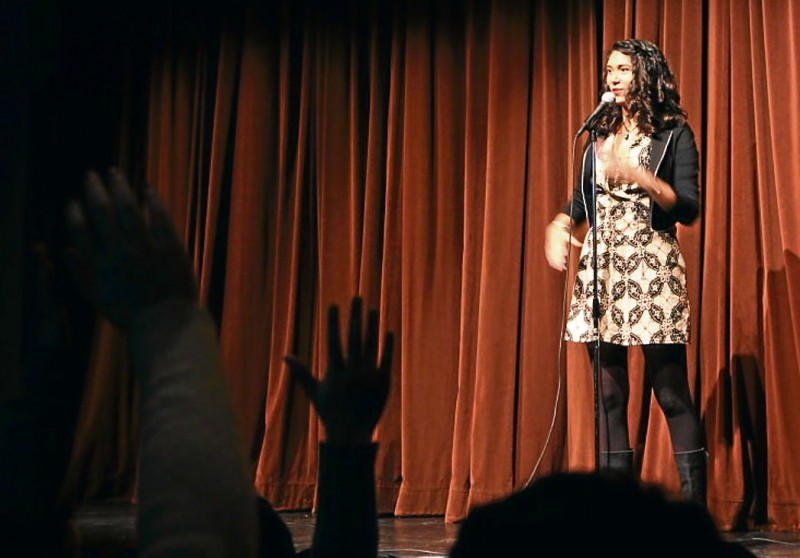Love and spoken word
As usual, it started with a girl. She was my first crush. I met her during one of our soirees in second year and I’d heard that she liked spoken word.
She was a fan of Sarah Kay, kept poetry around the house, and memorized a couple of verses here and there to throw around—“When love arrives” was her favorite piece to recite. I’d gotten into the scene too, having first discovered Shane Koyczan during an impromptu open mic held in a first floor function room of our high school building.
Both of us bonded over shared favorite lines, YouTube links sent over Messenger, and back-and-forth text messaged haikus made on the spot. I was worthy of Internet tropes and countless young adult novels—a lonely, introverted writer looking for love in all the wrong places—so, when I met her, I decided that I’d found it.
After being introduced by a friend to a café in faraway Malate where spoken word performances were held regularly, I set my mind to writing her a poem. My fingers were too slow on the guitar for a traditional harana, and my singing voice often signaled oncoming rainshowers; I found a way out in the syllables and spaces of free verse.
I stole images as needed, taking notes on polluted Manila skies and trying to name the stars that shone past the smoke; I spent physics class jotting on the margins of a beat-up notebook, figuring out assonance and internal rhyme; even my English teacher got annoyed, noting that we’d already finished poetry three semesters ago.
When the work was finished on a Word document, I spent hours inside my bedroom filling the air with verse and hoping my parents wouldn’t catch me awake at one in the morning, Travis Bickle-ing my way through tongue-twisted rhymes. After weeks of working and thinking and wondering, I finally worked up the guts to ask her out on a date—with friends. So, sort of a date (Still counts).
The poem itself was a spilling out of words and ink and teenage hormones, like a song I couldn’t put notes to except in the way I paused in between breaths and traded rhymes for exhalations. And on the crumpled pages of short bond I carried into the car, I could still feel the glow of laptop screens opened on Google Docs and late-night Facebook chats with her smile in my mind all coming together. I stowed the backpack with the poem in the trunk of the car and tried not to think too hard about what I was going to do.
A friend was driving me, and he found the café, tucked on the edge of a car-heavy road and blocked off by a guardhouse; this was after 30 minutes spent on unintentional detours into red-light districts and a quick stop at a fast-food for fried chicken. We camped out in the parking lot next to the doorway where the lights were dim enough for me to practice without being noticed. Afterwards, I entered and grabbed a table by the corner of the stage, while my friend snuck my name into the performer list for the open mic that night; I crossed my fingers waiting for her to arrive.
The hours got long and I listened to about seven other unrequited love poems without seeing her come through the door. So I called in a bit of a frenzy but got nothing (later that night I learned that cellular signal didn’t reach the café’s interior).
Then, suddenly, my name was called and my friend was pushing me toward the stage, the short bond sheets shaking in my hands and the microphone suddenly too far up on the stand. I managed a nervous hi to the audience—some on their phones, some eating dinner, some rapt with attention—and made one last darting look at the door, but saw nothing.
It was too late to wait now, though. So I took a deep breath and ran through the whole piece, voice shaking almost as much as my hands, pins and needles forming on my skin, heart beating far too fast for my ribcage. Some applause, and the host approached me with a quick question before I left the stage:
“So, who was that poem for?”
“For a friend of mine … but she couldn’t make it tonight.”
I got home that night and spent a few minutes too long thinking about her. Then there were a couple more back and forth messages on Facebook until, after a few months, she eventually stopped saying hello. The poem’s still stored somewhere in my bedroom drawer, underneath practical tests and chemistry assignments, but I never ended up telling her about it. Maybe that’s for the best.
Mark Lim is a third-year high school student at Xavier School San Juan. He enjoys spoken word, coming-of-age fiction, and love stories (so long as they are not his).
PREVIOUS ENTRIES





















